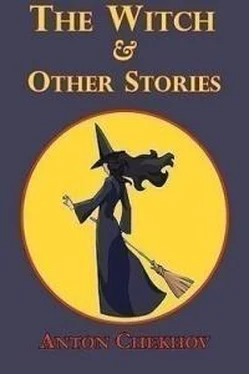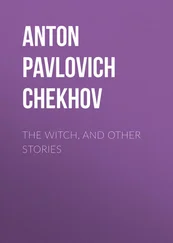In the overwhelming rush of his fancies, of artistic images of the past and sweet presentiments of happiness in the future, the poor wretch sank into silence, merely moving his lips as though whispering to himself. The vacant, blissful smile never left his lips. The constables were silent. They were pondering with bent heads. In the autumn stillness, when the cold, sullen mist that rises from the earth lies like a weight on the heart, when it stands like a prison wall before the eyes, and reminds man of the limitation of his freedom, it is sweet to think of the broad, rapid rivers, with steep banks wild and luxuriant, of the impenetrable forests, of the boundless steppes. Slowly and quietly the fancy pictures how early in the morning, before the flush of dawn has left the sky, a man makes his way along the steep deserted bank like a tiny speck: the ancient, mast–like pines rise up in terraces on both sides of the torrent, gaze sternly at the free man and murmur menacingly; rocks, huge stones, and thorny bushes bar his way, but he is strong in body and bold in spirit, and has no fear of the pine–trees, nor stones, nor of his solitude, nor of the reverberating echo which repeats the sound of every footstep that he takes.
The peasants called up a picture of a free life such as they had never lived; whether they vaguely recalled the images of stories heard long ago or whether notions of a free life had been handed down to them with their flesh and blood from far–off free ancestors, God knows!
The first to break the silence was Nikandr Sapozhnikov, who had not till then let fall a single word. Whether he envied the tramp's transparent happiness, or whether he felt in his heart that dreams of happiness were out of keeping with the grey fog and the dirty brown mud—anyway, he looked sternly at the tramp and said:
"It's all very well, to be sure, only you won't reach those plenteous regions, brother. How could you? Before you'd gone two hundred miles you'd give up your soul to God. Just look what a weakling you are! Here you've hardly gone five miles and you can't get your breath."
The tramp turned slowly toward Nikandr, and the blissful smile vanished from his face. He looked with a scared and guilty air at the peasant's staid face, apparently remembered something, and bent his head. A silence followed again…. All three were pondering. The peasants were racking their brains in the effort to grasp in their imagination what can be grasped by none but God—that is, the vast expanse dividing them from the land of freedom. Into the tramp's mind thronged clear and distinct pictures more terrible than that expanse. Before him rose vividly the picture of the long legal delays and procrastinations, the temporary and permanent prisons, the convict boats, the wearisome stoppages on the way, the frozen winters, illnesses, deaths of companions….
The tramp blinked guiltily, wiped the tiny drops of sweat from his forehead with his sleeve, drew a deep breath as though he had just leapt out of a very hot bath, then wiped his forehead with the other sleeve and looked round fearfully.
"That's true; you won't get there!" Ptaha agreed. "You are not much of a walker! Look at you—nothing but skin and bone! You'll die, brother!"
"Of course he'll die! What could he do?" said Nikandr. "He's fit for the hospital now…. For sure!"
The man who had forgotten his name looked at the stern, unconcerned faces of his sinister companions, and without taking off his cap, hurriedly crossed himself, staring with wide–open eyes…. He trembled, his head shook, and he began twitching all over, like a caterpillar when it is stepped upon….
"Well, it's time to go," said Nikandr, getting up; "we've had a rest."
A minute later they were stepping along the muddy road. The tramp was more bent than ever, and he thrust his hands further up his sleeves. Ptaha was silent.
MELITON SHISHKIN, a bailiff from the Dementyev farm, exhausted by the sultry heat of the fir–wood and covered with spiders' webs and pine–needles, made his way with his gun to the edge of the wood. His Damka—a mongrel between a yard dog and a setter—an extremely thin bitch heavy with young, trailed after her master with her wet tail between her legs, doing all she could to avoid pricking her nose. It was a dull, overcast morning. Big drops dripped from the bracken and from the trees that were wrapped in a light mist; there was a pungent smell of decay from the dampness of the wood.
There were birch–trees ahead of him where the wood ended, and between their stems and branches he could see the misty distance. Beyond the birch–trees someone was playing on a shepherd's rustic pipe. The player produced no more than five or six notes, dragged them out languidly with no attempt at forming a tune, and yet there was something harsh and extremely dreary in the sound of the piping.
As the copse became sparser, and the pines were interspersed with young birch–trees, Meliton saw a herd. Hobbled horses, cows, and sheep were wandering among the bushes and, snapping the dry branches, sniffed at the herbage of the copse. A lean old shepherd, bareheaded, in a torn grey smock, stood leaning against the wet trunk of a birch–tree. He stared at the ground, pondering something, and played his pipe, it seemed, mechanically.
"Good–day, grandfather! God help you!" Meliton greeted him in a thin, husky voice which seemed incongruous with his huge stature and big, fleshy face. "How cleverly you are playing your pipe! Whose herd are you minding?"
"The Artamonovs'," the shepherd answered reluctantly, and he thrust the pipe into his bosom.
"So I suppose the wood is the Artamonovs' too?" Meliton inquired, looking about him. "Yes, it is the Artamonovs'; only fancy…I had completely lost myself. I got my face scratched all over in the thicket."
He sat down on the wet earth and began rolling up a bit of newspaper into a cigarette.
Like his voice, everything about the man was small and out of keeping with his height, his breadth, and his fleshy face: his smiles, his eyes, his buttons, his tiny cap, which would hardly keep on his big, closely–cropped head. When he talked and smiled there was something womanish, timid, and meek about his puffy, shaven face and his whole figure.
"What weather! God help us!" he said, and he turned his head from side to side. "Folk have not carried the oats yet, and the rain seems as though it had been taken on for good, God bless it."
The shepherd looked at the sky, from which a drizzling rain was falling, at the wood, at the bailif's wet clothes, pondered, and said nothing.
"The whole summer has been the same," sighed Meliton. "A bad business for the peasants and no pleasure for the gentry."
The shepherd looked at the sky again, thought a moment, and said deliberately, as though chewing each word:
"It's all going the same way…. There is nothing good to be looked for."
"How are things with you here?" Meliton inquired, lighting his cigarette. "Haven't you seen any coveys of grouse in the Artamonovs' clearing?"
The shepherd did not answer at once. He looked again at the sky and to right and left, thought a little, blinked…. Apparently he attached no little significance to his words, and to increase their value tried to pronounce them with deliberation and a certain solemnity. The expression of his face had the sharpness and staidness of old age, and the fact that his nose had a saddle–shaped depression across the middle and his nostrils turned upwards gave him a sly and sarcastic look.
"No, I believe I haven't," he said. "Our huntsman Eryomka w as saying that on Elijah's Day he started one covey near Pustoshye, but I dare say he was lying. There are very few birds."
"Yes, brother, very few…. Very few everywhere! The shooting here, if one is to look at it with common sense, is good for nothing and not worth having. There is no game at all, and what there is is not worth dirtying your hands over—it is not full–grown. It is such poor stuff that one is ashamed to look at it."
Читать дальше












